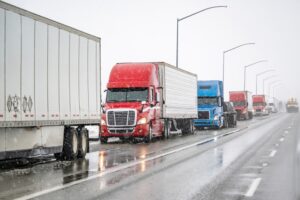
A new bill introduced in Congress would raise the minimum liability insurance required of trucking companies nationwide — a move that safety advocates are applauding. Since 1980, motor carriers have been required to carry a minimum of $750,000 in liability insurance coverage when carrying general freight. But this minimum hasn’t been adjusted for medical-cost inflation, and $750,000 in today’s dollars would be over $5 million. The bill, known as the Fair Compensation for Truck Crash Victims Act, would require trucking companies to adjust their minimum insurance to better match up with current cost of living expenses. It would also index the requirement to inflation so that it’ll keep up with rising costs.
The bill is sponsored by Rep. Jesús Garcia (D-IL), who introduced similar legislation in 2019 and 2021. Both of those bills were referred to subcommittees and didn’t move forward in the House. If it passes, the Fair Compensation for Truck Crash Victims Act would likely change the trucking industry.
Groups like the Truck Safety Coalition have spoken out in favor of the bill, saying it addresses “fundamental equity issues for crash victims” while also improving safety for everyone on the road. But motor carriers have opposed previous versions of the legislation, arguing that it would be difficult for smaller trucking companies to survive with the increased insurance costs. The Owner–Operator Independent Drivers Association (OOIDA) and other motor carrier organizations said in a 2021 letter that the majority of truck crashes were covered by current minimum insurance limits.
In the letter addressed to the House Committee on Transportation & Infrastructure, the organizations said increasing minimum insurance requirements wouldn’t improve highway safety and would “significantly” increase operational costs for truckers, farmers, and manufacturers. OOIDA has voiced the same concerns about the latest iteration of the bill, asking its more than 150,000 members to speak up against the legislation.
Catastrophic Injuries from Trucking Accidents
Any car accident can result in serious injuries, but trucking accidents are especially dangerous for passenger vehicle occupants. The average large truck is 20 to 30 times heavier than a car, and it can have devastating results when the two collide. Tractor trailers also carry the unique risk of underride crashes, which occur when a car slides underneath the body of a large truck. A collision with a large truck is more likely to cause catastrophic injuries.
Some of the most common injuries caused by trucking accidents include broken bones, spinal cord injuries, amputations, soft tissue damage, and traumatic brain injuries. In some cases, accident victims are able to recover within a few weeks or months of the trucking accident. But in severe situations, an accident victim may need lifelong, around-the-clock care — and the expenses quickly add up. Research has found that the lifetime cost of traumatic brain injuries is up to $3 million. For people with paralysis, the cost skyrockets to a potential $5 million. Hospital bills, rehabilitation expenses, and lost wages once someone loses their ability to work can all contribute to a staggering cost. That doesn’t account for non-economic losses, like pain and suffering and a decreased quality of life.
If a motor carrier is underinsured, it may be difficult to receive the payout you need after an accident. Increasing minimum liability coverage requirements could help avoid this scenario. Increasing insurance requirements could also lead insurers to vet motor carriers more stringently to ensure that they meet safety standards — which could reduce the number of unsafe trucks on the road. Raising minimum liability coverage would transform the trucking industry in the U.S. as a whole. But until the bill becomes law, motorists run the risk of a truck driver not carrying enough insurance to cover the costs following a catastrophic accident.
What To Do After A Trucking Accident
The moments after a trucking accident can be chaotic, especially if there are injuries. But you should know what steps to take if you find yourself in the aftermath of a truck accident. Along with exchanging information with other drivers and potential witnesses, you should take pictures of all involved vehicles and make a note of any external damage. Then, you should seek medical attention — even if you don’t think you’ve been seriously injured. It can take time for the adrenaline of a truck crash to wear off, and some injuries aren’t apparent until days or even weeks after a crash.
If you’ve been involved in a West Virginia trucking accident, you should also find a qualified truck accident attorney. A lawyer can help you deal with the motor carrier’s insurance company and determine whether filing a personal injury lawsuit is best. If you or a loved one have suffered catastrophic injuries in a trucking accident, you may need to sue to recover from the losses you’ve experienced.
The West Virginia truck accident attorneys at Paulson & Nace represent victims who have been injured in accidents and need fair compensation. We hold trucking companies and their insurers accountable for the pain they’ve caused. Contact our firm online or call (202) 463-1999 for a free case review.

With the law firm of Paulson & Nace, Mathew Nace's practice areas include medical malpractice, trucking litigation, auto collision, premises liability, wrongful death and other catestrophic negligence and personal injury matters. He is licensed to practice in Maryland, West Virginia, and the District of Columbia.














Comments for this article are closed.